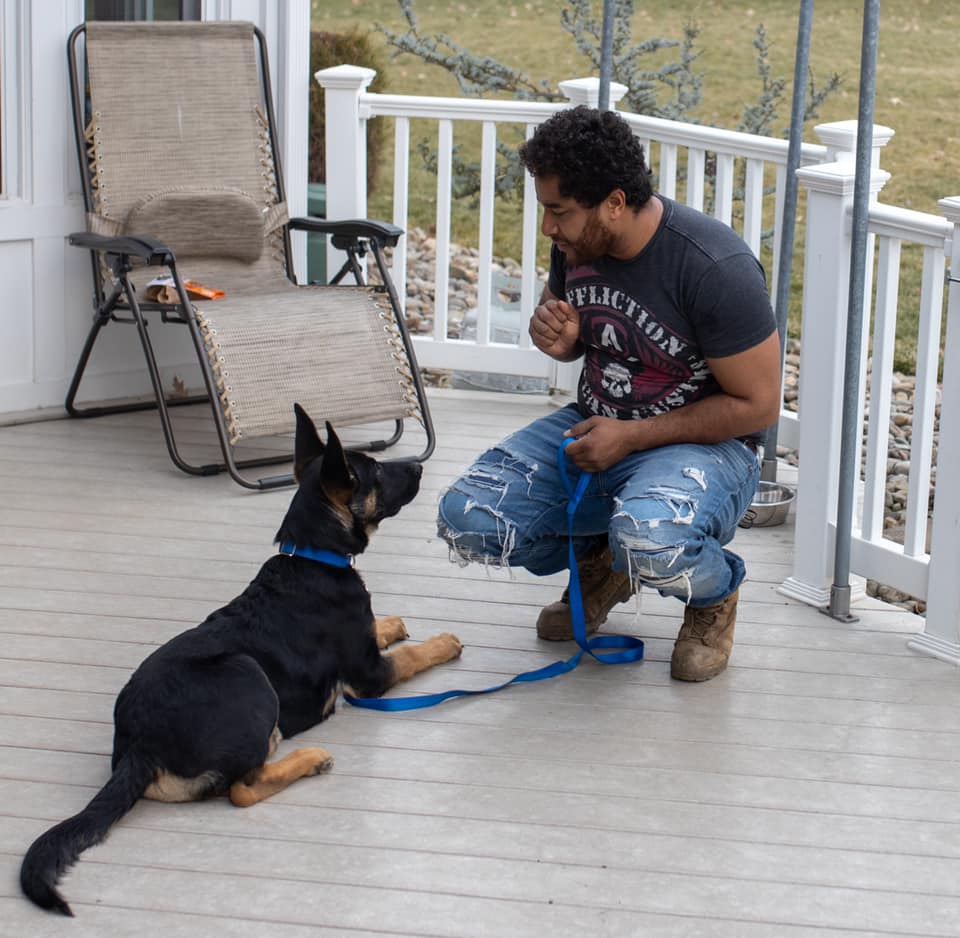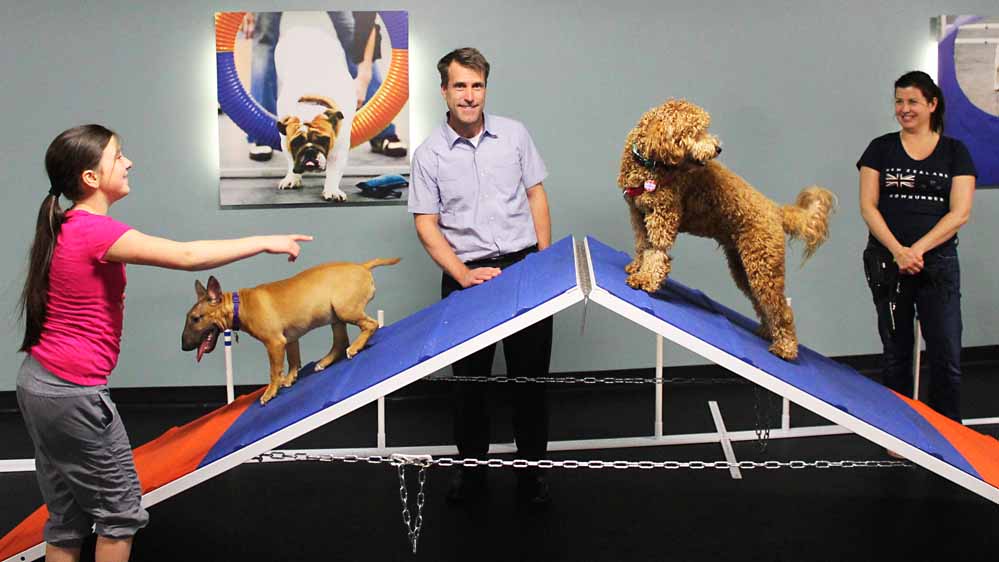Dog Training Near Me vs. Online Courses: Which Works Better?
Efficient Strategies for Successful Pet Dog Training: A Comprehensive Overview
Efficient pet dog training needs a nuanced understanding of canine behavior. It depends upon the concepts of positive reinforcement and consistency. Fitness instructors should acknowledge the significance of necessary commands and socializing. Attending to typical behavioral issues can transform a pet's personality. As the bond between owner and dog strengthens, the way they connect evolves. The journey of effective training incorporates different techniques that might shock also seasoned pet proprietors. What are the essential aspects that can make a considerable difference?
Recognizing Dog Habits
Recognizing canine habits is vital for reliable pet dog training, as it allows fitness instructors to translate a pet dog's actions and reactions in various circumstances. Canines communicate mainly through body movement, articulations, and face expressions. Identifying signs of aggressiveness, tension, or anxiety can assist fitness instructors change their methods to guarantee a positive training experience. As an example, a wagging tail does not always suggest happiness; the context and various other body hints have to be taken into consideration.
Additionally, comprehending a pet's breed-specific qualities can offer understandings right into their habits patterns and impulses. Socializing plays a crucial function in forming a dog's actions to new individuals and environments. Observing a pet dog's play design can also reveal their personality and convenience levels. By very carefully evaluating these habits, fitness instructors can produce tailored approaches that promote discovering and enhance the bond in between canine and proprietor, eventually causing more effective training outcomes.
The Relevance of Positive Support
Positive support is a vital method in canine training that boosts the discovering procedure by rewarding wanted habits. This technique motivates pet dogs to repeat activities that generate favorable end results, such as deals with, praise, or playtime (Dog Training Near Me). By associating etiquette with benefits, pet dogs come to be extra inspired and engaged throughout training sessions

Integrating positive reinforcement right into training routines can result in quicker understanding and far better retention of commands. It advertises a joyful atmosphere that boosts both the pet's experience and the fitness instructor's complete satisfaction, making it a fundamental aspect of effective canine training.
Necessary Commands Every Pet Ought To Know

Producing a Consistent Training Set Up
Developing a regular training timetable is important for effective dog training, as it helps enhance knowing and creates a sense of regular for the canine. An organized method enables both the pet dog and the instructor to expect training sessions, which can improve emphasis and interaction. Ideally, training sessions ought to be short, long-term between 5 to 15 minutes, to maintain the canine's interest and interest.
Incorporating training into everyday tasks, such as nourishment or strolls, can additionally promote uniformity. This integration helps dogs connect training with positive experiences. It is very important for instructors to remain adaptable; unexpected occasions may demand changes to the routine.
Additionally, rep is essential. Normal technique of commands and habits strengthens discovering and builds self-confidence. By sticking to a constant routine, instructors can guarantee that their pets develop great habits and respond accurately to commands, laying the groundwork for reliable training results.
Socializing: Key to a Well-Adjusted Pet
Socialization is important for a dog's growth, influencing their behavior and communications with individuals and various other pets. Very early direct exposure to different atmospheres, sounds, and experiences can substantially enhance a dog's versatility and confidence. Employing efficient socializing techniques can aid guarantee a well-adjusted canine friend.
Relevance of Very Early Socialization

Strategies for Reliable Socializing
While lots of pet dog proprietors acknowledge the importance of socializing, recognizing effective strategies to facilitate this process is essential for promoting a well-adjusted pet dog. Gradual exposure to diverse atmospheres, individuals, and various other animals can significantly improve a pet dog's comfort level in numerous scenarios. Favorable support plays a vital duty; fulfilling preferred actions motivates canines to approach brand-new experiences with confidence. Structured playdates with well-mannered pets assist mitigate and establish social abilities fear reactions. Registering in obedience courses can additionally supply regulated atmospheres for socializing. Ultimately, keeping a tranquil attitude as a proprietor reinforces the pet's complacency, enabling more effective interactions. These techniques jointly add to a balanced and adaptable canine friend.
Handling Usual Behavioral Issues
Managing usual behavior issues is crucial for maintaining a harmonious partnership between dogs and their owners. Secret challenges such as hostility, excessive barking, and leaping habits need targeted approaches to manage effectively. Comprehending the origin of these habits can lead to effective treatments and a much more balanced canine companion.
Resolving Aggression Issues
Aggressiveness in pet dogs can show up in various types, posing obstacles for proprietors and fitness instructors alike. Dealing with these concerns demands a comprehensive understanding of the underlying reasons, which might include territoriality, concern, or source securing. Identifying triggers is essential; owners should observe their canine's body language and actions to pinpoint details situations that prompt aggression. Favorable reinforcement strategies can efficiently customize aggressive habits, satisfying tranquil reactions to determined triggers. Consistency is crucial, and proprietors need to continue to be patient throughout the training procedure. Sometimes, professional guidance from a licensed pet instructor or behaviorist might be required, especially for severe hostility. Inevitably, the objective is to develop a risk-free setting for both the dog and those around it.
Managing Excessive Barking
Extreme barking can be a considerable annoyance for canine proprietors and neighbors alike, frequently signaling underlying concerns that require resolving. Identifying the triggers behind the barking is necessary; these might consist of boredom, anxiety, or a response to external stimuli. Owners should observe their canine's actions and setting to pinpoint the reason. Dog Training Near Me. Executing regular training strategies, such as favorable reinforcement, can effectively minimize barking. Instructing commands like "quiet" or redirecting the pet dog's focus at the minute of barking can be advantageous. Furthermore, supplying adequate physical and psychological excitement through workouts and interactive playthings can minimize boredom-related barking. In many cases, seeking advice from a specialist instructor or behaviorist might be necessary to create customized methods that resolve relentless barking worries
Decreasing Jumping Behavior
Several canines show leaping behavior, frequently as a method of revealing enjoyment or seeking interest from their owners and site visitors. This actions can be troublesome, particularly when it results in unintended injuries or discomfort for visitors. To decrease leaping, proprietors must initially remain calm and avoid compensating the habits with interest, as this can strengthen it. Instead, they can instruct an alternative behavior, such as resting, by awarding the dog for continuing to be calm when a person strategies. Uniformity is key; all relative should implement the same policies. Additionally, training sessions need to include disturbances to assist the pet learn to manage their impulses. With time, with persistence and perseverance, jumping Read Full Report can be greatly lowered, leading to an extra enjoyable environment.
Constructing a Solid Bond With Educating
Although educating a pet dog commonly concentrates on behaviors and commands, it likewise acts as an important possibility to enhance the bond in between the canine and its owner. Participating in training sessions promotes interaction, common understanding, and trust. When owners invest time in showing their dogs, they demonstrate commitment, which helps the canine feel safe and secure and valued. Favorable reinforcement techniques, such as deals with and appreciation, not just motivate wanted behaviors yet additionally enhance the emotional link in between the canine and proprietor.
Moreover, uniformity in training builds a sense of integrity, permitting pets to understand their duty within the house. Each successful command boosts the dog's self-confidence, causing a deeper connection. Routine training sessions can end up being delightful bonding experiences, loaded with playfulness and communication - Dog Training Near Me. Eventually, the process of training transcends simple obedience, creating a collaboration that enriches the lives of both the dog and its owner
Often Asked Inquiries
What Age Is Best to Beginning Training a Puppy?
The most effective age to start educating a pup is usually between 8 to 12 weeks. At this phase, young puppies are most receptive to learning, making it an excellent time for foundational training and socialization.
How much time Should Each Educating Session Last?
The optimal duration for each and every canine training session generally ranges her explanation from 5 to 15 mins, relying on the pet's age and interest span. Short, concentrated sessions improve finding out and retention, making training a lot more pleasurable and efficient.
Can Older Canines Still Be Trained Efficiently?
Older pets can certainly be educated successfully. With perseverance and constant techniques, they can find out new commands and behaviors. Their experience often makes them more responsive to training, enhancing the bond between pet dog and proprietor.
What Devices Do I Required for Training?
For effective canine training, crucial tools consists of a tough chain, a comfortable harness, high-value treats, training clickers, and a selection of toys. These tools promote interaction and reinforce positive behaviors during training sessions.
Just how Do I Track My Pet's Training Development?
To track a canine's training development, one can maintain a journal, record landmarks, and note behavioral adjustments. Regular evaluations, including timed commands and obedience examinations, help determine improvement and recognize locations needing further attention.
Understanding canine behavior is important for reliable dog training, as it permits instructors to translate a canine's actions and reactions in different circumstances. Establishing a regular training routine is vital for efficient pet training, as it assists strengthen knowing and creates a sense of regular for the pet dog. Educating a pet often concentrates on commands and behaviors, it likewise serves as an essential possibility to enhance the bond between the dog and its proprietor. When proprietors spend time in educating their canines, they demonstrate commitment, which assists the pet really feel secure and valued. The suitable duration for each dog training session normally ranges from 5 to 15 mins, depending on the pet's age and interest period.